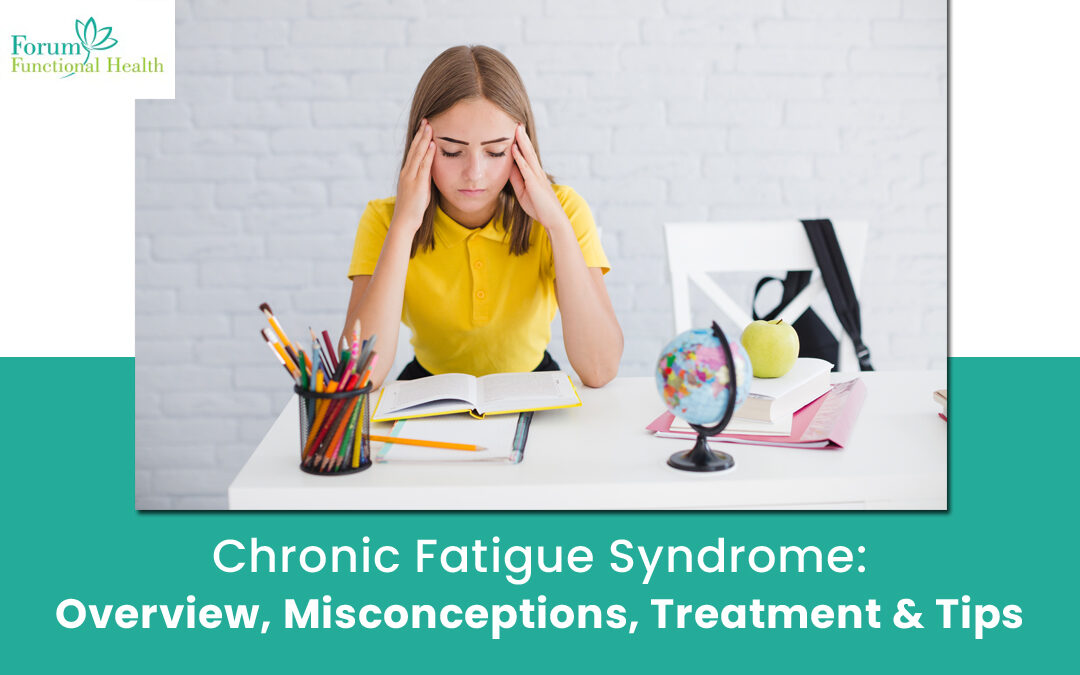Fatigue

by Forum Functional Health Center | May 1, 2024 | Fatigue
Have you ever experienced a moment where you suddenly feel weak for no apparent reason? It’s a perplexing sensation, leaving you wondering what could be causing it and how to regain your energy. This phenomenon, often referred to as sudden weakness or fatigue, can stem from various factors, ranging from lifestyle choices to underlying health conditions. In this blog post, we’ll delve into the potential causes of sudden weakness and explore effective treatment options, including those available at the Forum Functional Health Center in McKinney, TX.
What Suddenly Feel Weak?
- Dehydration: One of the most common reasons for sudden weakness is dehydration. Even mild dehydration can lead to fatigue and lethargy as it affects the body’s ability to transport nutrients and oxygen to cells effectively.
- Lack of Sleep: Sleep plays a crucial role in maintaining overall health and energy levels. Chronic sleep deprivation or poor sleep quality can leave you feeling weak and exhausted during the day.
- Nutritional Deficiencies: Your body needs a balanced diet to function optimally. Deficiencies in essential nutrients such as iron, vitamin D, vitamin B12, and magnesium can contribute to feelings of weakness and fatigue.
- Stress and Anxiety: Mental health plays a significant role in physical well-being. Chronic stress and anxiety can drain your energy levels and leave you feeling weak and depleted.
- Underlying Health Conditions: Sudden weakness can also be a symptom of underlying health issues such as thyroid disorders, diabetes, heart disease, anemia, or chronic fatigue syndrome. It’s essential to consult with a healthcare professional to rule out any serious medical conditions.
Treatment Options for Sudden Weakness
- Hydration: Drinking an adequate amount of water throughout the day is essential for combating dehydration and maintaining optimal energy levels. Aim for at least eight glasses of water per day, more if you’re engaging in strenuous physical activity or experiencing hot weather.
- Sleep Hygiene: Establishing healthy sleep habits can help improve the quality and duration of your sleep. Create a relaxing bedtime routine, avoid screens before bed, and ensure your sleep environment is conducive to rest.
- Nutritional Supplements: If you suspect a nutritional deficiency, consider incorporating supplements into your diet under the guidance of a healthcare professional. Iron, vitamin D, vitamin B12, and magnesium supplements can help address deficiencies and boost energy levels.
- Stress Management: Implementing stress-reduction techniques such as mindfulness, meditation, yoga, or deep breathing exercises can help alleviate feelings of stress and anxiety, thereby improving energy levels.
- Medical Evaluation: If your sudden weakness persists or is accompanied by other concerning symptoms, it’s crucial to seek medical attention. A healthcare provider can conduct a thorough evaluation, including blood tests and other diagnostic procedures, to identify any underlying health conditions.
Forum Functional Health Center in McKinney, TX
If you’re experiencing persistent weakness or fatigue and are seeking comprehensive healthcare solutions, consider visiting the Forum Functional Health Center in McKinney, TX. At Forum Functional Health, we take a holistic approach to healthcare, addressing the root causes of your symptoms and providing personalized treatment plans tailored to your individual needs.
Our team of experienced healthcare professionals, including doctors, nutritionists, and wellness coaches, will work closely with you to identify any underlying health issues contributing to your weakness and fatigue. Through advanced diagnostic testing and integrative treatment modalities, we aim to restore your energy levels and improve your overall quality of life.
Whether you’re struggling with chronic fatigue, nutritional imbalances, or stress-related issues, the Forum Functional Health Center is here to support you on your journey to optimal health and vitality.
Don’t let sudden weakness hold you back from living your best life. Take proactive steps towards addressing the root causes of your symptoms and reclaim your energy and vitality today.
If you’re in McKinney, TX, and seeking fatigue treatment, contact the Forum Functional Health Center to schedule a consultation and start your journey towards renewed health and wellness.
In conclusion, sudden weakness can be a concerning and disruptive experience, but it’s essential to recognize that it often stems from manageable factors such as dehydration, lack of sleep, nutritional deficiencies, stress, or underlying health conditions. By addressing these factors through lifestyle modifications, nutritional support, stress management, and medical intervention when necessary, you can overcome sudden weakness and regain your energy and vitality.
Remember, your health is your greatest asset, and investing in it pays dividends in every aspect of your life. Take the first step towards a healthier, more energized future today.
Also Read:- Understanding ADHD in Children: A Comprehensive Guide to Symptoms, Causes, and Treatment

by Forum Functional Health Center | Apr 22, 2024 | Fatigue
Fatigue is a common symptom experienced by many individuals at some point in their lives. While it can often be attributed to factors such as stress, lack of sleep, or a hectic lifestyle, it’s essential not to overlook the possibility that fatigue could indicate something more serious, such as cancer. In this article, we’ll delve into the relationship between fatigue and cancer, exploring how it can play a crucial role in the diagnosis of this disease.
Understanding Fatigue and Its Potential Link to Cancer:
Fatigue, often described as an overwhelming sense of tiredness or lack of energy, is one of the most common complaints among individuals seeking medical attention. While it can be caused by a myriad of factors, including physical and psychological issues, it’s important to recognize that persistent, unexplained fatigue may sometimes be a symptom of an underlying health condition, including cancer.
The Connection Between Fatigue and Cancer:
Research has shown that fatigue can indeed be a symptom of various types of cancer, including but not limited to leukemia, lymphoma, breast cancer, and lung cancer. In some cases, cancer-related fatigue may be caused by the disease itself, as cancer cells consume energy and disrupt normal bodily functions. Additionally, cancer treatments such as chemotherapy, radiation therapy, and surgery can also contribute to fatigue by affecting healthy cells and tissues in the body.
Identifying Fatigue as a Potential Warning Sign:
For individuals experiencing persistent fatigue that cannot be attributed to other factors, it’s crucial to seek medical attention promptly. Healthcare professionals can conduct a thorough evaluation, including a physical examination, medical history review, and possibly diagnostic tests such as blood tests, imaging studies, or biopsies, to determine the underlying cause of the fatigue.
The Role of Functional Health Forums:
Forums focused on functional health, such as Forum Functional Health, provide the best fatigue treatment in McKinney, Texas, and also serve as valuable resources for individuals seeking information and support regarding fatigue and its potential link to cancer. These online communities provide a platform for sharing experiences, exchanging advice, and accessing credible information from healthcare professionals and fellow members.
Fatigue Treatment in McKinney, Texas:
For individuals in McKinney, Texas, experiencing fatigue or concerned about its possible connection to cancer, seeking assistance from healthcare providers specializing in fatigue treatment is essential. These professionals can offer personalized evaluation and management plans tailored to address the individual’s unique needs and concerns.
Conclusion:
While fatigue is a common and often benign symptom, it’s essential not to dismiss it, particularly when it persists or is accompanied by other concerning symptoms. By understanding the potential link between fatigue and cancer and seeking timely medical evaluation, individuals can take proactive steps towards early detection and effective management of this serious disease. Remember, your health is paramount, and seeking assistance from qualified healthcare professionals is always advisable, Contact us for more details.
Read More:- Understanding the Changes: A Comprehensive Guide to PreMenopause, PeriMenopause, and Menopause for Every Woman

by Forum Functional Health Center | Mar 20, 2024 | Fatigue
In today’s fast-paced world, fatigue has become a common complaint for many individuals. Whether it’s due to hectic schedules, poor sleep habits, or high stress levels, feeling constantly tired can significantly impact our overall well-being and productivity. Fortunately, there are several strategies you can incorporate into your daily routine to combat fatigue and boost your energy levels effectively.
1. Prioritize Quality Sleep
One of the most crucial factors in combating fatigue is ensuring you get adequate and restful sleep. Aim for 7-9 hours of uninterrupted sleep each night, and establish a consistent sleep schedule to regulate your body’s internal clock. Create a relaxing bedtime routine, minimize exposure to screens before bed, and ensure your sleep environment is comfortable and conducive to rest.
2. Stay Hydrated
Dehydration can contribute to feelings of fatigue and lethargy. Make it a habit to drink plenty of water throughout the day to stay hydrated. Avoid excessive consumption of caffeinated or sugary beverages, as they can lead to energy crashes later on. Herbal teas and infused water are excellent alternatives to keep you hydrated and refreshed.
3. Maintain a Balanced Diet
Nutrition plays a significant role in energy levels and overall health. Focus on consuming a balanced diet rich in fruits, vegetables, whole grains, lean proteins, and healthy fats. Avoid relying on processed foods and sugary snacks, as they can cause fluctuations in blood sugar levels and energy crashes. Incorporate regular meals and snacks to sustain energy levels throughout the day.
4. Engage in Regular Exercise
Regular physical activity is essential for improving energy levels and combating fatigue. Aim for at least 30 minutes of moderate exercise most days of the week. Find activities you enjoy, whether it’s walking, jogging, cycling, or yoga, and make them a regular part of your routine. Exercise helps increase circulation, release endorphins, and improve overall energy and mood.
5. Manage Stress
Chronic stress can drain your energy reserves and leave you feeling exhausted. Practice stress management techniques such as deep breathing, meditation, yoga, or mindfulness to help reduce stress levels and promote relaxation. Prioritize activities that bring you joy and relaxation, and learn to delegate tasks or say no when necessary to avoid burnout.
6. Take Regular Breaks
Allow yourself time to rest and recharge throughout the day by taking short breaks. Stand up, stretch, or go for a brief walk to combat the effects of prolonged sitting and improve circulation. Break up tasks into smaller, manageable chunks to prevent mental fatigue and maintain focus and productivity.
7. Limit Screen Time
Excessive screen time, particularly before bed, can disrupt sleep patterns and contribute to feelings of fatigue. Set boundaries on your screen usage and establish a digital curfew before bedtime. Engage in relaxing activities such as reading, listening to music, or practicing gratitude instead of scrolling through your phone or computer.
8. Practice Good Posture
Poor posture can lead to muscle tension, fatigue, and decreased energy levels. Pay attention to your posture throughout the day, whether sitting at a desk, standing, or walking. Sit up straight, keep your shoulders relaxed, and avoid slouching to prevent unnecessary strain on your muscles and joints.
9. Seek Social Support
Maintaining strong social connections is essential for mental and emotional well-being, which can directly impact energy levels. Spend time with friends and family members who uplift and support you, and engage in meaningful conversations and activities together. Socializing can help reduce stress, boost mood, and increase feelings of energy and vitality.
10. Consider Professional Help
If fatigue persists despite implementing lifestyle changes, consider seeking advice from a healthcare professional. Chronic fatigue could be a symptom of an underlying medical condition such as sleep disorders, thyroid dysfunction, or vitamin deficiencies. A healthcare provider can help identify the root cause of your fatigue and recommend appropriate treatment options.
Incorporating these strategies into your daily routine can help combat fatigue and boost your energy levels naturally. Remember that consistency is key, and small changes over time can lead to significant improvements in your overall well-being. By prioritizing quality sleep, nutrition, exercise, stress management, and self-care, you can reclaim your energy and vitality to live life to the fullest.
For personalized guidance on optimizing your energy levels and overall health, consider scheduling a consultation with our team at Forum Functional Health Center. Our experienced healthcare professionals can provide individualized recommendations and support to help you achieve your wellness goals. Don’t let fatigue hold you back – take charge of your health and vitality today.

by Forum Functional Health Center | Feb 16, 2024 | Fatigue
Feeling constantly tired and drained of energy can be incredibly debilitating, affecting every aspect of your life. While reaching for a quick fix like caffeine or energy drinks may provide temporary relief, the key to sustained vitality lies in making lasting lifestyle changes. In this comprehensive guide, we’ll explore a variety of strategies and techniques to naturally boost your energy levels and combat fatigue. From prioritizing sleep to implementing stress-reducing practices, you’ll discover actionable steps to revitalize your body and mind.
Prioritize Sleep: One of the most effective ways to combat fatigue is by ensuring you get an adequate amount of sleep each night. Aim for 7-9 hours of uninterrupted sleep to allow your body to fully recharge and repair. Create a relaxing bedtime routine, avoid screens before bed, and optimize your sleep environment for maximum comfort and tranquility. Investing in a comfortable mattress and pillows can make a significant difference in the quality of your sleep.
Stay Hydrated: Dehydration can contribute to feelings of fatigue and lethargy, so it’s important to prioritize hydration throughout the day. Aim to drink at least 8-10 glasses of water daily, and consider incorporating hydrating foods like fruits and vegetables into your diet. Keep a reusable water bottle with you at all times as a reminder to stay hydrated, and limit your intake of dehydrating beverages like alcohol and caffeine.
Fuel Your Body Right: Proper nutrition plays a crucial role in sustaining energy levels throughout the day. Focus on incorporating a balanced diet rich in whole foods, including fruits, vegetables, lean proteins, and healthy fats. Avoid sugary snacks and processed foods, which can cause energy crashes and fluctuations in blood sugar levels. Instead, opt for nutritious snacks like nuts, seeds, and yogurt to provide sustained energy without the crash.
Move Your Body: Regular physical activity is not only essential for maintaining a healthy weight and preventing chronic diseases but also for boosting energy levels and reducing fatigue. Aim for at least 30 minutes of moderate exercise most days of the week, incorporating a mix of cardiovascular, strength training, and flexibility exercises. Find activities that you enjoy, whether it’s hiking, dancing, or practicing yoga, and make movement a priority in your daily routine.
Practice Stress Management: Chronic stress can take a toll on your physical and mental well-being, leading to fatigue and burnout. Implement stress-reducing practices such as deep breathing exercises, meditation, and mindfulness to promote relaxation and restore balance. Take regular breaks throughout the day to engage in activities that bring you joy and provide an opportunity to recharge, whether it’s going for a walk in nature, listening to music, or spending time with loved ones.
Establish a Consistent Routine: Creating a structured daily routine can help regulate your body’s internal clock and improve overall energy levels. Aim to wake up and go to bed at the same time each day, even on weekends, to establish a consistent sleep-wake cycle. Plan your meals and snacks at regular intervals to prevent energy dips and maintain stable blood sugar levels. Incorporate time for relaxation and leisure activities into your schedule to ensure a healthy work-life balance.
Limit Caffeine and Alcohol: While caffeine and alcohol may provide temporary energy boosts, they can also disrupt your sleep patterns and lead to increased fatigue in the long run. Limit your intake of caffeinated beverages like coffee, tea, and energy drinks, especially in the afternoon and evening hours. Similarly, be mindful of your alcohol consumption and aim to drink in moderation to avoid the negative effects on sleep quality and overall energy levels.
Take Breaks: In today’s fast-paced world, it’s easy to fall into the trap of overworking and neglecting our need for rest and relaxation. However, taking regular breaks throughout the day is essential for maintaining productivity and preventing burnout. Incorporate short breaks into your workday to stretch, move around, and clear your mind. Schedule regular vacations and downtime to recharge and rejuvenate, allowing yourself to return to your responsibilities with renewed energy and focus.
Optimize Your Environment: Your physical environment can have a significant impact on your energy levels and overall well-being. Create a sleep-friendly bedroom by minimizing noise, light, and distractions, and invest in blackout curtains and white noise machines if necessary. Keep your workspace organized and clutter-free to promote focus and productivity, and incorporate elements of nature such as plants and natural light to boost mood and energy levels.
Seek Professional Help
If you find yourself struggling with ongoing fatigue despite your best efforts, don’t hesitate to seek professional assistance. Consulting with a healthcare provider, at Forum Functional Health Center, can provide valuable insights and support. Our experienced team specializes in identifying and addressing the underlying causes of fatigue, offering personalized treatment plans to suit your individual needs.
At Forum Functional Health Center, we take a holistic approach to wellness, considering factors such as nutrition, lifestyle, and mental health in addition to medical evaluations. Our goal is to empower you with the knowledge and resources needed to overcome fatigue and regain your vitality.
Through comprehensive assessments and collaborative discussions, we can develop a tailored plan of action that may incorporate dietary adjustments, targeted supplementation, stress management techniques, and other therapeutic interventions. With our guidance and support, you can take proactive steps towards achieving optimal energy levels and overall well-being.

by Forum Functional Health Center | Jan 24, 2024 | Fatigue
Chronic fatigue, a continuous and overwhelming sense of tiredness, extends beyond physical exhaustion. It puts a pall over many parts of our health, including cognitive functions – the systems that control our thinking, learning, and memory. In the current research, we look at the complex interaction between chronic fatigue and the brain, try to understand how this disease affects our mental capacities.
Defining Chronic Fatigue
Chronic fatigue is not a fleeting feeling of tiredness after a busy day; rather, it is a persistent and unrelenting sense of weariness that lasts for an extended period, often for six months or more. The exact cause of chronic fatigue syndrome (CFS), the medical condition associated with chronic fatigue, remains elusive, making it a complex and challenging phenomenon to understand.
The Brain’s Role in Fatigue
To comprehend the impact of chronic fatigue on brain functions, it’s essential to grasp the brain’s central role in regulating our energy levels and overall well-being. The brain, a powerhouse of interconnected neurons, is responsible for orchestrating various bodily functions, including sleep, mood, and cognitive processes.
Cognitive Functions
Cognitive functions encompass a wide array of mental activities that enable us to interact with the world. These include memory, attention, problem-solving, and decision-making. Think of cognitive functions as the software that runs on the brain’s hardware, allowing us to navigate our daily lives with ease.
The Connection between Chronic Fatigue and Cognitive Functions
Chronic fatigue doesn’t merely manifest as physical tiredness; it can infiltrate the very core of our cognitive abilities. Individuals experiencing chronic fatigue often report difficulties with concentration, memory lapses, and a general sense of mental fogginess. These cognitive challenges can significantly impact one’s quality of life and daily functioning.
- Memory Impairment: One of the notable effects of chronic fatigue on brain functions is memory impairment. The brain relies on optimal energy levels to encode, store, and retrieve memories efficiently. When chronic fatigue disrupts this delicate balance, individuals may experience difficulties remembering details, events, or even simple tasks.
- Attention and Concentration: Chronic fatigue can also compromise attention and concentration. The brain requires sustained focus to perform tasks effectively, and fatigue disrupts this process. Those grappling with chronic fatigue may find it challenging to concentrate on a task for an extended period, leading to decreased productivity and increased frustration.
- Processing Speed: The speed at which our brain processes information is another cognitive aspect affected by chronic fatigue. Tasks that were once performed swiftly may become slower and more mentally taxing, adding an extra layer of challenge to daily activities.
- Executive Function: Executive function, a set of mental skills that help with managing time, paying attention, switching focus, planning and organizing, is vulnerable to the impacts of chronic fatigue. Individuals with chronic fatigue may find it harder to initiate tasks, prioritize activities, and adapt to changes in plans.
Understanding how chronic fatigue affects the brain
Understanding how chronic fatigue affects the brain involves exploring the underlying mechanisms that contribute to these cognitive changes. While the precise biological processes are still being researched, several factors may contribute to the cognitive impact of chronic fatigue.
- Neurotransmitter Deregulation: Neurotransmitters, chemicals that facilitate communication between neurons, play a crucial role in cognitive functions. Chronic fatigue may disrupt the delicate balance of neurotransmitters, affecting the efficiency of information transmission in the brain.
- Sleep Disturbances: Chronic fatigue is often accompanied by sleep disturbances, such as insomnia or disrupted sleep patterns. Sleep is essential for cognitive restoration, and its deprivation can exacerbate cognitive challenges, leading to a vicious cycle of fatigue and cognitive decline.
- Inflammation: Inflammation, a common feature in chronic fatigue syndrome, may contribute to cognitive impairments. Elevated levels of inflammatory markers in the body can impact the brain, leading to changes in cognition and mood.
Coping strategies for chronic fatigue management
While chronic fatigue’s impact on cognitive functions can be daunting, there are strategies individuals can employ to manage these challenges and improve their overall well-being
Pacing: Pacing involves breaking tasks into manageable segments and allowing for sufficient rest periods. By pacing activities, individuals with chronic fatigue can conserve energy and reduce the cognitive strain associated with sustained effort.
Sleep Hygiene: Establishing good sleep hygiene practices is crucial for managing chronic fatigue and its cognitive effects. Maintaining a consistent sleep schedule, creating a comfortable sleep environment, and practicing relaxation techniques can contribute to better sleep quality.
Cognitive Behavioural Therapy (CBT): CBT is a therapeutic approach that can be beneficial for individuals with chronic fatigue. It focuses on identifying and changing negative thought patterns and behaviors, offering tools to cope with the challenges posed by chronic fatigue.
Mindfulness and Meditation: Mindfulness practices and meditation can help improve focus and reduce stress, promoting overall cognitive well-being. These techniques empower individuals to cultivate a present-focused awareness that can mitigate the impact of chronic fatigue on cognitive functions.
What’s next
At the Forum Functional Health Center, we recognize the profound impact of chronic fatigue on brain function, and our approach is anchored in a multidisciplinary framework.
This collaborative approach not only deepens our understanding of the condition but also empowers us to develop comprehensive and personalized treatment strategies. Through this multidisciplinary lens, we aim to enhance diagnostics, offering more precise insights into the nuances of each individual’s experience with chronic fatigue.
Ultimately, our goal is to pave the way for a future where those living with this condition can access tailored interventions that not only alleviate symptoms but also significantly improve their overall quality of life.

by Forum Functional Health Center | Jan 3, 2024 | Fatigue
Chronic Fatigue Syndrome (CFS), also known as Myalgic Encephalomyelitis (ME), is a complex and debilitating medical condition that affects millions of people worldwide. Despite its prevalence, there are many misconceptions and misunderstandings surrounding CFS, leading to inadequate support and treatment for those affected. This blog aims to provide a comprehensive overview of CFS, dispel common misconceptions, explore potential treatment options, and offer practical tips for managing daily life with this chronic illness. Whether you are someone living with CFS or seeking to understand and support a loved one, this blog will provide valuable insights and resources.
Understanding chronic fatigue syndrome
Understanding chronic fatigue syndrome is key to providing proper support and treatment for individuals affected by this debilitating condition. CFS is characterized by extreme fatigue that is not alleviated by rest and lasts for at least six months. However, fatigue is just one of the many symptoms experienced by individuals with CFS. Other common symptoms include cognitive impairments, muscle pain, joint pain, sleep disturbances, and flu-like symptoms.
It is important to note that CFS is not a psychological disorder, as some misconceptions suggest. It is a genuine physical illness that can have a significant impact on an individual’s quality of life. The exact cause of CFS is still unknown, but it is believed to involve a combination of factors, including viral infections, immune system dysfunction, and hormonal imbalances.
Common misconceptions about chronic fatigue syndrome
Despite the growing awareness and understanding of chronic fatigue syndrome (CFS), there are still several misconceptions surrounding this complex condition. These misconceptions often stem from the lack of education and limited research on the subject. It is crucial to address and debunk these misconceptions to ensure that individuals with CFS receive the support and treatment they need.
One common misconception is that CFS is simply a result of laziness or a lack of motivation. This could not be further from the truth. CFS is a legitimate medical condition that severely impacts a person’s ability to carry out daily activities and can leave them bedridden for extended periods. It is essential to recognize that individuals with CFS are not lazy, but rather facing significant physical and cognitive challenges.
Another misconception is that CFS is a rare condition that only affects a small number of individuals. However, studies estimate that between 836,000 to 2.5 million people in the United States have CFS. This makes it a relatively common condition, although it is often underdiagnosed due to its complex nature and the lack of specific diagnostic markers.
Furthermore, some believe that CFS is caused by psychological factors or is purely a mental illness. This misconception can be detrimental to individuals seeking support and understanding. While the exact cause of CFS is still uncertain, extensive research suggests that it is a multifactorial condition, involving various physiological and immunological factors. Dismissing CFS as a psychological disorder undermines the experiences of those living with the condition and hinders progress in finding effective treatments.
Many people assume that CFS can be cured by simply resting or getting more sleep. While rest is certainly crucial for managing CFS symptoms, it is not a cure. In fact, people with CFS often experience a worsening of symptoms after exertion, known as post-exertional malaise. This makes it challenging for individuals with CFS to engage in normal daily activities without experiencing severe fatigue and other debilitating symptoms.
Treating chronic fatigue syndrome: medical and alternative approaches
Treating chronic fatigue syndrome (CFS) can be a complex and challenging process, as there is currently no cure for the condition. However, there are various medical and alternative approaches that can help manage symptoms and improve overall well-being for individuals with CFS.
In terms of medical treatments, there are no specific medications approved specifically for CFS. However, certain medications can be prescribed to address specific symptoms such as pain, sleep disturbances, and depression. For example, over-the-counter pain relievers or prescription medications may help alleviate muscle or joint pain associated with CFS. Additionally, antidepressant medications or sleep aids may be prescribed to improve sleep quality and manage mood-related symptoms.
In addition to medical treatments, many individuals with CFS find alternative approaches to be helpful in managing their symptoms. These may include therapies such as cognitive-behavioral therapy (CBT), which can assist individuals in coping with the psychological effects of CFS and improving their overall quality of life. Other alternative treatments that some individuals find beneficial include acupuncture, massage therapy, and dietary modifications.
Ultimately, the treatment plan for CFS should be tailored to the individual, taking into account their specific symptoms, needs, and preferences. It is important for individuals with CFS to work closely with their healthcare provider to develop a comprehensive treatment plan that includes a combination of medical and alternative approaches. In the next section, we will explore some practical tips and lifestyle modifications that can complement these treatment approaches and help individuals with CFS manage their symptoms effectively. Stay tuned for valuable insights on living well with chronic fatigue syndrome.
Lifestyle tips for managing chronic fatigue syndrome
Living with chronic fatigue syndrome (CFS) can be challenging, but there are lifestyle modifications and practical tips that can help individuals manage their symptoms effectively. Here are some valuable insights on living well with CFS:
Prioritize rest and sleep: Getting adequate rest is crucial for managing CFS. Establish a regular sleep routine and create a relaxing environment to promote better sleep quality. Consider taking short breaks throughout the day to conserve energy and prevent exhaustion.
Manage stress: Stress can worsen CFS symptoms. Practice stress-reducing techniques such as meditation, deep breathing exercises, or mindfulness. It may also be helpful to establish healthy boundaries, delegate tasks, and learn to say no when necessary.
Maintain a healthy diet: Eating a nutritious diet can support overall well-being. Focus on consuming whole foods, such as fruits, vegetables, lean proteins, and whole grains. Stay hydrated and limit caffeine and sugary beverages, as they can disrupt sleep patterns.
Pace yourself: Overexertion can lead to an exacerbation of symptoms. Learn to pace yourself and break tasks into manageable chunks. Prioritize activities and delegate whenever possible.
Seek support: Connect with others who understand your experience with CFS. Join support groups, either online or in-person, where you can share your challenges and gain valuable insights from others living with the condition.
Seeking support and resources for chronic fatigue syndrome
In an era flooded with scientific advancements, it’s disheartening to witness the prevalence of chronic diseases like adrenal fatigue, a condition often overlooked within the realms of conventional medicine. The poignant reality persists – while countless suffer, conventional treatments often focus merely on symptom alleviation rather than addressing the root cause. Enter the realm of hope and precision in healing through Functional Medicine, a paradigm that strives to unearth the origins of ailments and eradicate them at their core.
Diverging from the conventional diagnostic path, Functional Medicine practitioners, especially those certified by the Forum Functional Healthcare, embark on a holistic journey. Instead of relying on commonplace diagnoses, they delve deep into the intricacies of physiological imbalances and dysfunctions. Armed with a battery of scientific tests – from Complete Metabolic Blood Tests to Adrenal Salivary Index, Hormonal Assays, Stool Testing, Urinalysis, Leaky Gut Testing, Heavy Metal Testing, and Food Sensitivity Testing – these practitioners leave no stone unturned.
A certified Forum Functional Healthcare practitioner doesn’t view a patient as a collection of symptoms but as a unique whole. This approach, marked by a commitment to scientific evidence and comprehensive testing, is fast emerging as the preferred healthcare choice for those seeking not just symptom management, but a true healing journey. In the era of Functional Medicine, the emphasis is on treating the root cause, not merely the surface-level manifestations.






